The SSNAPP initiative has developed Neighbourhood Safety Plans for the N9A, N8X, N8Y, and N8W postal code areas in the City of Windsor based on insights gathered from the community in June of 2024.
The following is a combination of all SSNAPP Neighbourhood Safety Plans which includes specific information for residents of Windsor, however, can be applied throughout Windsor-Essex County.
Why Access a Neighbourhood Safety Plan?
- Learn how to protect yourself and respond to emergencies.
- Know what to do in situations like mental health crises, harassment, or substance use emergencies.
- Access contacts for local services, including mental health support and emergency assistant.
Disclaimer: This Neighbourhood Safety Plan is designed for residents in Windsor, Ontario to provide general guidelines, support strategies, and information to help promote a safer community environment. The recommendations and strategies are provided as general guidance and may not be suitable for every individual or situation. The creators of this Neighbourhood Safety Plan do not guarantee the effectiveness of it or any of its components and are not responsible for any outcomes or consequences resulting from its use. These materials are intended for informational purposes only and is not a substitute for professional medical, psychological, or legal advice. In the event of an emergency, call 911 immediately.
New! Informational Videos
Substance Supports in Neighbourhoods Accessed through Police Partnerships (SSNAPP) has produced a series of videos highlighting services and messages related to mental health and substance use.
Watch the videos below to learn more about the important work being done in the community
Call 911 for emergencies needing police, fire, or ambulance help or if there is immediate threat to life or bodily harm, violence, weapons, or a medical emergency. Available 24/7.
Call 311 for city information, requests about municipal programs, and non-emergency services including parks and recreation, street issues, needle disposal, and more.
Text: 311
Email: 311@citywindsor.ca
Online: www.311online.ca
App: download ‘Windsor 311’
If located outside of Windsor, please contact your local municipality or local by-law as appropriate.
Call 211 for help with programs and services in your area, including mental health, housing, and employment. Available 24/7.
Email: info@211southwestontario.ca
Online: www.211southwest.ca
Windsor Police Service Non-Emergency Line
Call 519-258-6111 for non-emergency police help or to file a report. For example, filing a noise complaint either by phone or online.
Email: info@windsorpolice.ca
Online: www.windsorpolice.ca
If located outside of Windsor, please contact your local police service non-emergency line.
Windsor and Essex County Crime Stoppers
Call 519-258-8477 to report a crime or leave a tip anonymously.
Encountering Someone Experiencing a Mental Health Crisis
SIGNS:
ACTIONS:
- Ensure Your Safety First. Stay Calm, Keep a Safe Distance, or Walk Away if You Feel Unsafe.
- Call 911 if There’s Immediate Danger.
If You Feel Safe and Comfortable to Help, Consider These Steps:
- Listen to the Person and Show You Care.
“I can see that this is really hard for you.” - Support, Not Solutions.
“It’s OK to feel this way. Let’s find a way through it together.” - Use Non-Threatening Body Language.
Face them and nod to show you’re listening. - Use Non-Stigmatizing Language.
Stigma can shape opinions and stop people from getting help. “What you’re going through is real and important” is a good way to avoid blame. - Call 911 if There Are Safety Risks to the Person or Others, or Threats of Self-Harm or Harm to Others.
- Share Information About Local Mental Health Resources
- Follow Up with the Person if Possible.
Call 911 or go to your nearest emergency department if you’re facing immediate safety risks or feel like you’re a threat to yourself or others. Available 24/7.
Non-Emergency? Call the Windsor Crisis Response Team (CRT) at 519-255-6700 ext. 4203 to help people presenting symptoms of mental illness, substance use, behavioural disorders, or people in acute crisis situations within the City of Windsor.
If located outside of Windsor, call your local police service to access the Mobile Crisis Rapid Response Team (MCRRT), which responds to mental health crises and provides non-emergency mental health services.
In an overdose emergency, call 911 right away. The Good Samaritan Drug Overdose Act offers some legal protection for people who experience or witness an overdose and call 911. Learn more.
5 Steps to Respond to an Opioid Overdose Using Naloxone Nasal Spray
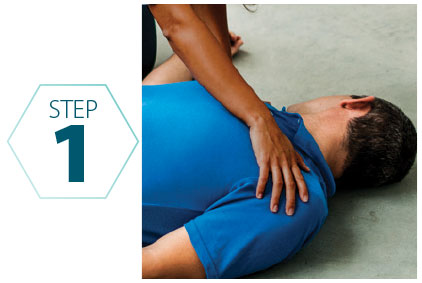
SHOUT their name
& SHAKE their shoulders
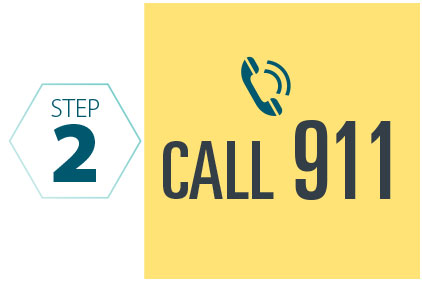
CALL 911
If they do not respond. Lay them on their back.
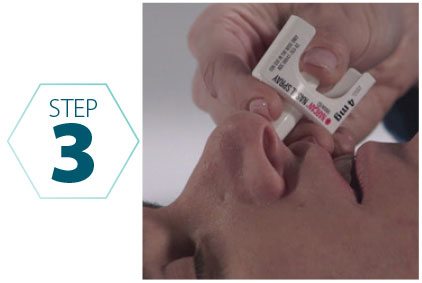
GIVE NALOXONE
Gently insert the tip of the nozzle into the nostril and press the plunger with your thumb to give the dose of naloxone. Do not test the spray.
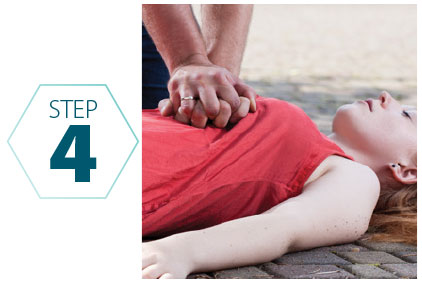
PERFORM CHEST COMPRESSIONS
(push HARD and FAST with each compression)
OR START CPR, if trained.
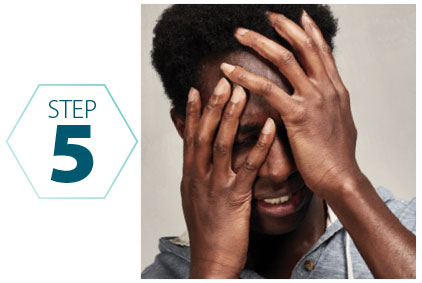
IS IT WORKING?
If no response after 2 to 3 minutes, repeat steps
3 and 4 (alternating nostrils) until person
responds or EMS arrives. Stay with them.
SIGNS of an OVERDOSE
Person is not responding
Breathing is slow or absent
Snoring/gurgling sounds
Blue fingernails or lips
Cold clammy skin
Pupils are tiny
Get a FREE naloxone kit at a local pharmacy or participating community organization.
If the person RESPONDS, place in the Recovery Position
to help keep their airway open and prevent choking.
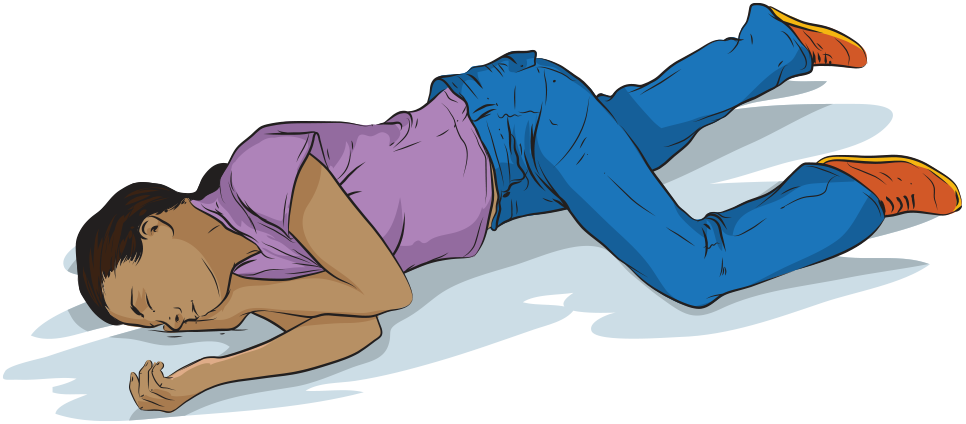
head should be tilted back slightly to open airway
hand supports head
knee stops body from rolling onto stomach
Save a Life, Carry Naloxone
Naloxone is a life-saving medication that can reverse an opioid overdose. Get a free Naloxone Nasal Spray Kit at participating local pharmacies. Find participating locations.
Tips for Safer Substance Use
- Never use alone.
- Try a very small amount first – “start low, go slow.”
- If you use with a friend, do not use at the same time.
- Avoid mixing substances.
- Have Naloxone ready. Know how to respond to an overdose.
- Call the National Overdose Response Service 24/7 hotline at 1-888-688-6677 for confidential support when using substances.
If you are experiencing a substance use crisis, call 911, contact Community Crisis Services at 519-973-4435, or go to your nearest emergency department.
Non-Emergency? The Nurse Police Team helps with non-emergency substance use related incidents within the City of Windsor. Call the Windsor Police Service Non-Emergency line at 519-258-6111 for help.
If located outside of Windsor, call or text 211 to get connected to local non-emergency mental health services.
If you find a needle on City of Windsor property, treat it as used and call 311 to report it and arrange for disposal.
If you find a needle on your private property, treat it as used and follow these steps:
- Wear gloves to protect from fluids.
- Use tongs or tweezers to pick up the needle by the middle of the syringe, with the sharp end facing down.
- Place the needle in a sharps container or a puncture-proof, sealable container and close it tightly.
- Remove gloves and wash your hands or use hand sanitizer.
- Dispose of the container at a sharps disposal bin or local pharmacy.
Landlords or property managers should contact a biohazard company for large quantities, consider installing sharps disposal bins (from local pharmacies), and report finds to 311 for data collection.
DO NOT:
- Throw loose sharps in the garbage.
- Put sharps in the recycling bin.
- Flush sharps down the toilet.
- Dispose of sharps in bushes, parks, or streets.
Learn more about needle disposal and find a list of 24-hour sharps disposal bin locations
SIGNS:
ACTIONS:
- Ensure Your Safety First. Stay Calm, Keep a Safe Distance, or Walk Away if You Feel Unsafe.
- Call 911 if There’s Immediate Danger.
If You Feel Safe and Comfortable to Help, Consider These Steps:
- Address the Harasser Calmly.
“That’s not OK. Please stop.” - Get Help if You Can’t Intervene.
Find a friend, bystander, or someone in authority to help or call 911 if the situation escalates. - Document the Incident if Safe.
Record the incident or take notes with details like time, location, and what was said. Respect the privacy of the person being harassed when sharing any recordings. - Check In and Offer Support.
Check in with the person being harassed and offer your support. - Report the Incident.
Report the incident or encourage the person being harassed to report it.
Need to Report a Harassment?
Call the Windsor Police Non-Emergency Line at 519-258-6111.
If located outside of Windsor, call your local police service for assistance, or call or text 211 to get connected to local services.
SIGNS:
ACTIONS:
- Ensure Your Safety First. Stay Calm, Keep a Safe Distance, or Walk Away if You Feel Unsafe.
- Call 911 if There’s Immediate Danger.
If You Feel Safe and Comfortable to Help, Consider These Steps:
- Acknowledge the Person with Respect.
Be polite, may eye contact, smile, and avoid making assumptions about them. - Talk to the Person.
“How’s your day going?” - Offer Help.
Give a meal, drink, or hygiene supplies (like wipes or bandages). - Connect Them to Resources.
If the person is receptive to help, connect them with local resources by calling or texting 211.
Call 311 to request a homelessness response or to report an encampment in your neighbourhood.
If located outside of Windsor, call your local police service non-emergency line for assistance.
SIGNS:
ACTIONS:
- Ensure Your Safety First. Stay Calm, Keep a Safe Distance, or Walk Away if You Feel Unsafe.
- Call 911 if There’s Immediate Danger.
If You Feel Safe and Comfortable to Help, Consider These Steps:
- Stay Calm and Non-Confrontational.
Use “I” statements instead of “You” statements. “I feel concerned seeing this argument escalating.” - Maintain Calm Body Language.
Keep your hands visible, make eye contact, and not to show you’re listening. - Create a Distraction to Interrupt the Conflict.
“I need help with something important. Can you give me a hand?” - Show Empathy.
“I can see that you’re really upset right now. It’s understandable given the situation.” - Offer Choices and Control.
“Would you prefer to discuss this now or would you like to take a moment to cool down first?” - Set Boundaries if Necessary.
“I think it would be helpful if we could keep the discussion focused on the issue, not on personal attacks.” - Get Help if There is Violence or the Situation Continues to Escalate.
Call the Windsor Police Non-Emergency Line at 519-258-6111 (or your local police service non-emergency line) or call 911 if there is immediate danger.
SIGNS:
The person may be subjected to racial slurs, derogatory comments, or insults based on their race or ethnicity. Intentionally excluded someone from an activity and displaying hostile body language, such as glaring or rolling eyes can also be indicators of discriminatory behaviour.
ACTIONS:
- Ensure Your Safety First. Stay Calm, Keep a Safe Distance, or Walk Away if You Feel Unsafe.
- Call 911 if There’s Immediate Danger.
If You Feel Safe and Comfortable to Help, Consider These Steps:
- Stay Calm and Non-Confrontational.
- Express Your Feelings.
Use “I” statements instead of “You” statements. “I feel uncomfortable when I hear comments like that.” - Show Support.
Stand next to the person being discriminated against to show support. - Address the Specific Behaviour.
“That joke/comment was offensive.” - Set Boundaries.
“I cannot tolerate any form of discrimination or racism. Please stop making these comments.” - Document and Report the Incident.
Record the incident or take notes with details like time, location, and what was said. Respect the privacy of the person being discriminated against when sharing any recordings. - Check In and Offer Support.
Check in with the person being discriminated against and offer your support.
Need to Make a Discrimination Complaint?
Call the Human Rights Tribunal of Ontario at 1-866-598-0322.
Were You a Victim of a Hate Crime or Hate-Motivated Incident?
Report online at www.windsorpolice.ca or call the Windsor Police Service Non-Emergency Line at 519-258-6111. A hate crime is a criminal act motivated by bias against race, religion, ethnicity, sexual orientation, gender, disability, or similar factors. Hate-motivated incidents include name-calling, racial insults, graffiti, or spreading hateful messages.
If located outside of Windsor, call your local police service non-emergency line for assistance.
SIGNS:
May include graffiti, broken windows or doors indicating forced entry, and damaged vehicles. You may also notice scratched signs, litter, or debris across your property.
ACTIONS:
- If Your Property Has Been Vandalized, Ensure Your Safety First and Avoid the Area if You Do Not Feel Safe.
- Call 911 if There’s Immediate Danger.
Consider These Steps for Preventing Vandalism:
- Secure Your Property.
Use locks, fences, and security systems. - Keep Your Property Clean and Well-Maintained.
- Install Bright, Motion-Sensor Lighting.
- Join or Start a Neighbourhood Watch Program.
For more information, call the Safety Village at 519-945-5500 or your local police service non-emergency line for assistance on neighbourhood safety. - Report Vandalism Right Away.
- Document any Damage.
- Clean or Cover Graffiti Quickly.
- Check if Your Property Insurance Covers Vandalism and Graffiti.
Ensure your property is safe by reviewing the Neighbourhood Safety and Security Handbook.
Need to Report Vandalism?
Call the Windsor Police Service Non-Emergency line at 519-258-6111 for vandalism to your private property or call 311 to report graffiti on City of Windsor’s public property.
If located outside of Windsor, call your local police service non-emergency line for assistance.
- Adhere to All Traffic Signals, Signs, and Speed Limits.
- Refrain from Using Your Mobile Device or Other Distractions While Driving.
- Ensure that All Passengers Are Wearing Seatbelts at All Times.
- Never Drive Under the Influence of Alcohol or Drugs.
- Be Aware of Other Road Users, Including Pedestrians, Cyclists, and Motorcyclists.
- Always Use Turn Signals When Changing Lanes or Turning.
- Drive Cautiously in Adverse Weather Conditions.
- Regularly Maintain Your Vehicle.
- Give the Right of Way to Emergency Vehicles with Flashing Lights and Sirens.
- Practice Patience When Driving.
Learn more in the transportation section at www.ontario.ca
Need to Report a Dangerous Driver or Traffic Complaint?
Call the Windsor Police Service Non-Emergency Line at 519-258-6111 or report online at www.windsorpolice.ca. Call 911 if you see an impaired driver, street racing, or other behaviour that is an immediate danger to public safety.
Road issues including potholes, flooding, or other road maintenance can be reported through 311.
If located outside of Windsor, call your local police service non-emergency line for assistance in a non-emergency situation and your local municipality for road issues/concerns.
Need to Report an Auto Burglary?
Call 911 if the burglary is in progress or if there is an immediate threat. Otherwise, call the Windsor Police Service Non-Emergency Line at 519-258-6111 or report online at www.windsorpolice.ca.
Ensure you report the burglary to your auto insurance company as soon as possible.
If located outside of Windsor, call your local police service non-emergency line for assistance.
SIGNS:
ACTIONS:
- Ensure Your Safety First. Stay Calm, Keep a Safe Distance, or Walk Away if You Feel Unsafe.
- Call 911 if There’s Immediate Danger.
Consider These Steps If You’ve Experienced Theft or Someone Trespassing onto Your Property:
- Contact the Windsor Police Service Non-Emergency Line at 519-258-6111 or report online at www.windsorpolice.ca
If outside of Windsor, call your local police service non-emergency line. - Document all details, including the time, location and description of events or stolen item(s).
- Notify your insurance company if you have insurance that covers theft.
- Take steps to prevent future incidents, such as installing fences, or displaying signs indicating private property.
- Avoid Direct Confrontation to Ensure Your Safety.
- Contact the Windsor Police Service Non-Emergency Line at 519-258-6111 to Report the Incident. If outside of Windsor, call your local police service non-emergency line.
Provide specific details about the location, description of the person, and any other relevant information. - If the Situation Escalates or Poses a Danger, Call 911.
Visit WEC CONNECT to access an inventory of substance use and mental health services available to residents of Windsor-Essex County.
For up-to-date information on municipal services, call 311, and for the latest information on mental health, housing/shelters, legal, employment resources, food resources, family services and more, call 211.
Health 811
Call 811 for free, secure, and confidential health advice from a registered nurse. Available 24/7.
Legal Assistance Windsor
Call 519-256-7831 for legal and social assistance.
Online: www.legalassistanceofwindsor.com
Windsor-Essex Community Health Centre
Call 519-997-2824 ext. 408 or 409 for support navigating the healthcare and social service system, or to access a variety of programs and services.
Online: www.weCHC.org
Windsor-Essex Local Immigration Partnership (WE LIP) ‘My Community Map’
The ‘My New Community Map’ helps newcomers, immigrants, and refugees find a variety of local programs and services, including child and youth, employment, health, housing, language, mental health and substance use, and more.
Online: www.workforcewindsoressex.com/mynewcommunitymap/
Windsor-Essex Ontario Health Team (WEOHT)
Access community resources and Mobile Medical Support, including primary care check-ups, wound care, mental health support, substance/addiction services, and more. Find where Mobile Medical Support will be located next at www.weoht.ca/resources
24-Hour Hotlines
Community Crisis Services
Call 519-973-4435 if you are experiencing a mental health crisis.
Connex Ontario
Call 1-866-531-2600 or text CONNEX to 247247 if you are experiencing problems with gambling, drugs, alcohol, or mental health.
Online: www.connexontario.ca
Kids Help Phone
Call 1-800-668-6868 or text CONNECT to 686868 for mental health counselling and mental health support, including accessing community support services.
Online: https://kidshelpphone.ca/
Ontario Poison Centre
Call 1-800-268-9017 or 911 if your child ingests a drug, or you or someone else is having a bad reaction to a drug.
Suicide Crisis Helpline
Call or text 988 for a safe space to talk if you need help or if you are worried about someone else.
Online: 988.ca

